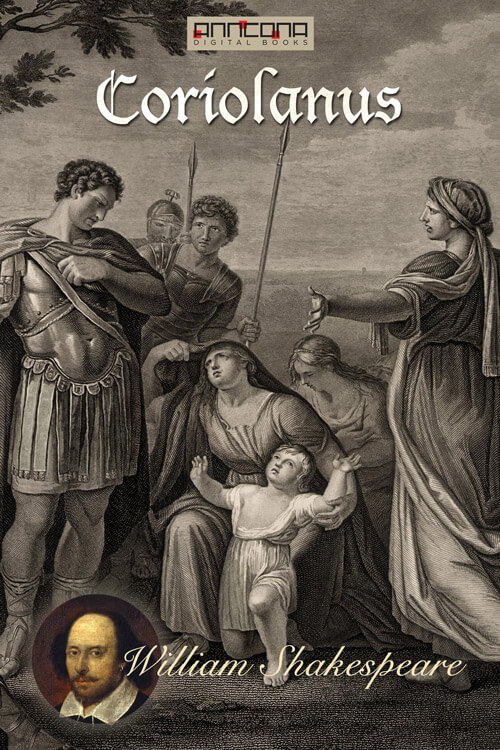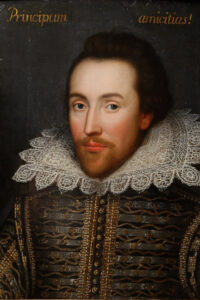
Coriolanus
ALL.
Resolved, resolved.
FIRST CITIZEN.
First, you know Caius Marcius is the chief enemy of the people.
ALL.
We know, we know.
FIRST CITIZEN. Let us kill him, and we’ll have corn at our price. Is it a verdict?
ALL.
No more talking won’t; let it be done: away, away!
SECOND CITIZEN.
One word, good citizens.
FIRST CITIZEN. We are accounted poor citizens; the patricians good. What authority surfeits on would relieve us; if they would yield us but the superfluity, while it were wholesome, we might guess they relieved us humanely; but they think we are too dear: the leanness that afflicts us, the object of our misery, is as an inventory to particularize their abundance; our sufferance is a gain to them.—Let us revenge this with our pikes ere we become rakes: for the gods know I speak this in hunger for bread, not in thirst for revenge.
SECOND CITIZEN.
Would you proceed especially against Caius Marcius?
FIRST CITIZEN.
Against him first: he’s a very dog to the commonality.
SECOND CITIZEN.
Consider what services he has done for his country.
FIRST CITIZEN. Very well; and could be content to give him good report fort, but that he pays himself with being proud.
SECOND CITIZEN.
Nay, but speak not maliciously.
FIRST CITIZEN. I say unto you, what he hath done famously he did it to that end: though soft-conscienced men can be content to say it was for his country, he did it to please his mother, and to be partly proud; which he is, even to the altitude of his virtue.
SECOND CITIZEN. What he cannot help in his nature you account a vice in him. You must in no way say he is covetous.
FIRST CITIZEN. If I must not, I need not be barren of accusations; he hath faults, with the surplus, to tire in repetition. [Shouts within.] What shouts are these? The other side of the city rises: why stay are we prating here? to the Capitol!
ALL.
Come, come.
FIRST CITIZEN.
Soft! who comes here?
SECOND CITIZEN.
Worthy Menenius Agrippa; one that hath always loved the people.
FIRST CITIZEN.
He’s one honest enough; would all the rest were so!
Read or download Book
William Shakespeare
William Shakespeare (April 1564 – 23 April 1616) was an English playwright, poet, and actor.
Biography.
He is widely regarded as the greatest writer in the English language and the world’s pre-eminent dramatist. He is often called England’s national poet and the “Bard of Avon” (or simply “the Bard”). His extant works, including collaborations, consist of some 39 plays, 154 sonnets, three long narrative poems, and a few other verses, some of uncertain authorship. His plays have been translated into every major living language and are performed more often than those of any other playwright. Shakespeare remains arguably the most influential writer in the English language, and his works continue to be studied and reinterpreted. Shakespeare was born and raised in Stratford-upon-Avon, Warwickshire. At the age of 18, he married Anne Hathaway, with whom he had three children: Susanna, and twins Hamnet and Judith.
Sometime between 1585 and 1592, he began a successful career in London as an actor, writer, and part-owner (sharer) of a playing company called the Lord Chamberlain’s Men, later known as the King’s Men. At age 49 (around 1613), he appears to have retired to Stratford, where he died three years later. Few records of Shakespeare’s private life survive; this has stimulated considerable speculation about such matters as his physical appearance, his sexuality, his religious beliefs, and whether the works attributed to him were written by others. Shakespeare produced most of his known works between 1589 and 1613. His early plays were primarily comedies and histories and are regarded as some of the best works produced in these genres. He then wrote mainly tragedies until 1608, among them Hamlet, Romeo and Juliet, Othello, King Lear, and Macbeth, all considered to be among the finest works in the English language. In the last phase of his life, he wrote tragicomedies (also known as romances) and collaborated with other playwrights. Many of Shakespeare’s plays were published in editions of varying quality and accuracy during his lifetime. However, in 1623, John Heminges and Henry Condell, two fellow actors and friends of Shakespeare’s, published a more definitive text known as the First Folio, a posthumous collected edition of Shakespeare’s dramatic works that includes 36 of his plays. Its Preface was a prescient poem by Ben Jonson, a former rival of Shakespeare, that hailed Shakespeare with the now famous epithet: “not of an age, but for all time”.






